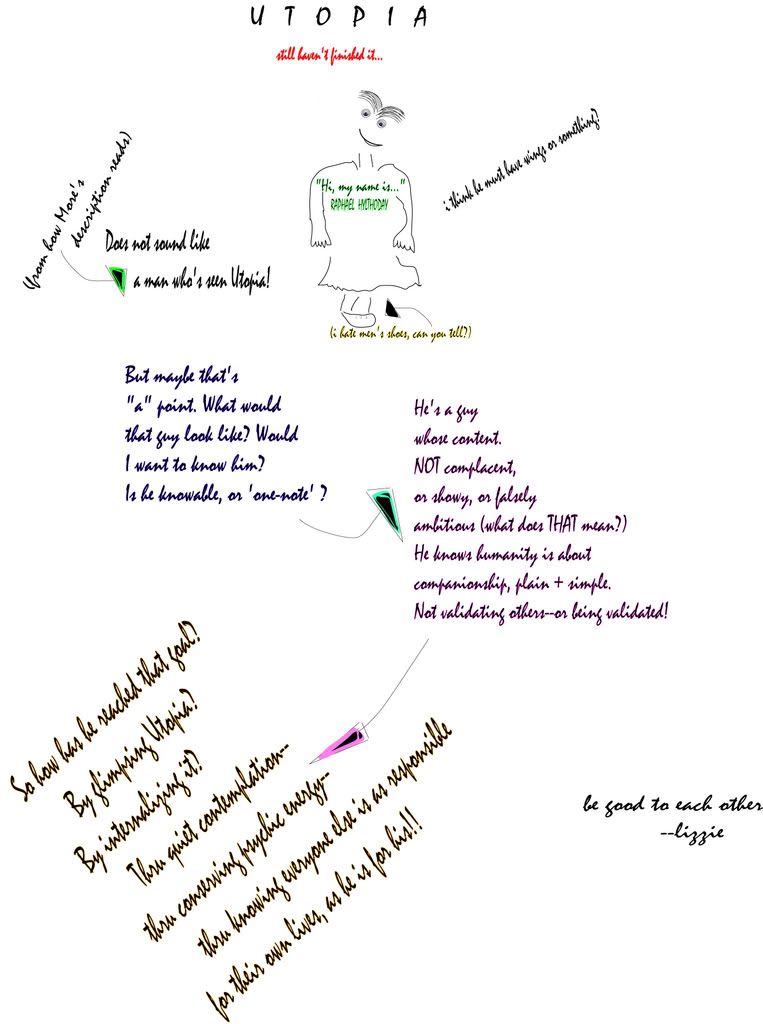She was a young girl with a dour face and oddly expressive eyes. Long before her affair with the married salesman, Miriam was a red-haired virgin who floated around Richland believing in fairy tales for a living, and cleaning other people’s houses. (Later, after she met the salesman she would always look at him- she searched him for something of Fritz).
He was short and he had bad eyesight, the reporter, and he had a way of wandering through town- lost in thought- oblivious to passerby until they were almost all the way by, almost out of earshot. Then, only then, he hollered out an excitable “Hello!” This Fritz, he had dark hair that sulked across his forehead at inopportune times, something like an obstinate child who just refuses to behave. He struck many townspeople as aloof. All in all, everyone in Richland whispered about the two, they got on so quick and so well.
Whenever the young girl saw him, her blank face lit like kindling. Dour expression, and an empty sort of canvas, she was instantly set free as her air mixed with his- their lives too enmeshed now for discernment. In the days after Fritz’s death, Miriam would sit all day in one of the apartments she was hired to clean. She stared out the filmy windows and remembered, her body growing warm, how his hands once thirsted for her- thrust deep inside of her as though his yearning could not be consoled until their bodies breathed as one.
Afterward, Richland forgot about Miriam until the married salesman chased down her dog in the park. In Miriam herself, though, there was a hint of the spectacular. Alone in her dull apartment, she worked ceaselessly- constantly remembering- trying to rebuild what a drunk driver took a split second to destroy.
A tall woman who wore the same black and white tank top for years- it was her work uniform- and as she did little else, it was her most comfortable piece of clothing. When she cleaned people’s houses, Miriam always thought of Fritz. She carried with her a notebook- the kind styled for journalists that he used to stuff in his back jeans pocket. Endlessly, relentlessly, she poured over their time together and at the precise moment of a recollection, she jotted down those words of his. Whatever they were, whenever they came upon her.
“I love you,” once… “We should go to the islands someday,” another time… “What were your parents like?”… “Why is the apartment of a housemaid so cluttered?”
She filled page after page- notebook after notebook- with her re-creations of him, and very quickly they became too heavy to carry.
The five-and-dime is closing... What was it Fritz had said about the owner’s gambling habit? The church is adding a new wing... He thought far too many people place their faith in buildings and in abstract concepts.
All in all, the story of Miriam and the reporter equals the sum of one odd tale. The girl awoke when she was in his company and he in hers. All of the town watched as sunrises came and went bleeding across the sky with frighteningly fast intensity- the difference in the days before Miriam and Fritz in Richland was equated by many to the difference on the countenances of each when they held the other. Quite possibly, the old town fell in love alongside them.
Miriam and the reporter had their exact beginnings on a fall afternoon. Fritz smirked the first time he saw her- what he called later “a smile gone wrong”- and he walked all the way to the end of the street before he found the courage to turn back around. She was beneath the awning on the stoop of the little clothing store, eating her lunch of apples and granola. When he came back, he stood in front of her and shaded his eyes. He tilted his body so he was level with her. “Best restaurant in town?” he asked.
“Their tailoring is to die for.” She locked gazes with him, she blushed.
Once, her family had been among the richest of all the legendary names in New England. That was before the stock market crash that ruined her parents’ computer business. Long after, long since the family parted ways- her parents headed to some retirement community in the South- Miriam suffered through the most horrific dreams. When she slept, her mind wound together visions of silicon transistor chips that mercilessly smothered her father.
Fritz listened to her tell this dream story more than once. “You felt like he became a machine.”
“I wouldn’t say that, no. Binary code at least gave a man like him some context. My grandmother said once ‘there was no knowing him until he learned to work a motherboard.’”
After Fritz and Miriam got together, they were rarely apart. They passed many an evening just talking in his apartment or driving his little black car through the country that surrounded Richland. She adored such things as hand holding and star gazing- he began to appreciate them as well.
“One day, I’ll finish my book,” Fritz said suddenly. Both had just finished gasping at the presence of a shooting star.
Later, after Fritz's funeral, after the arrest and trial of the drunk driver-an over-privileged teen with a closet full of fake ids- Miriam finally cleared her head enough to sort through the stacks of notebooks she’d filled with his words. If, more than anything, he wanted his story- then she would find it, here. And she would be the one to write it for him.
Friday, November 4, 2005
Subscribe to:
Comments (Atom)


